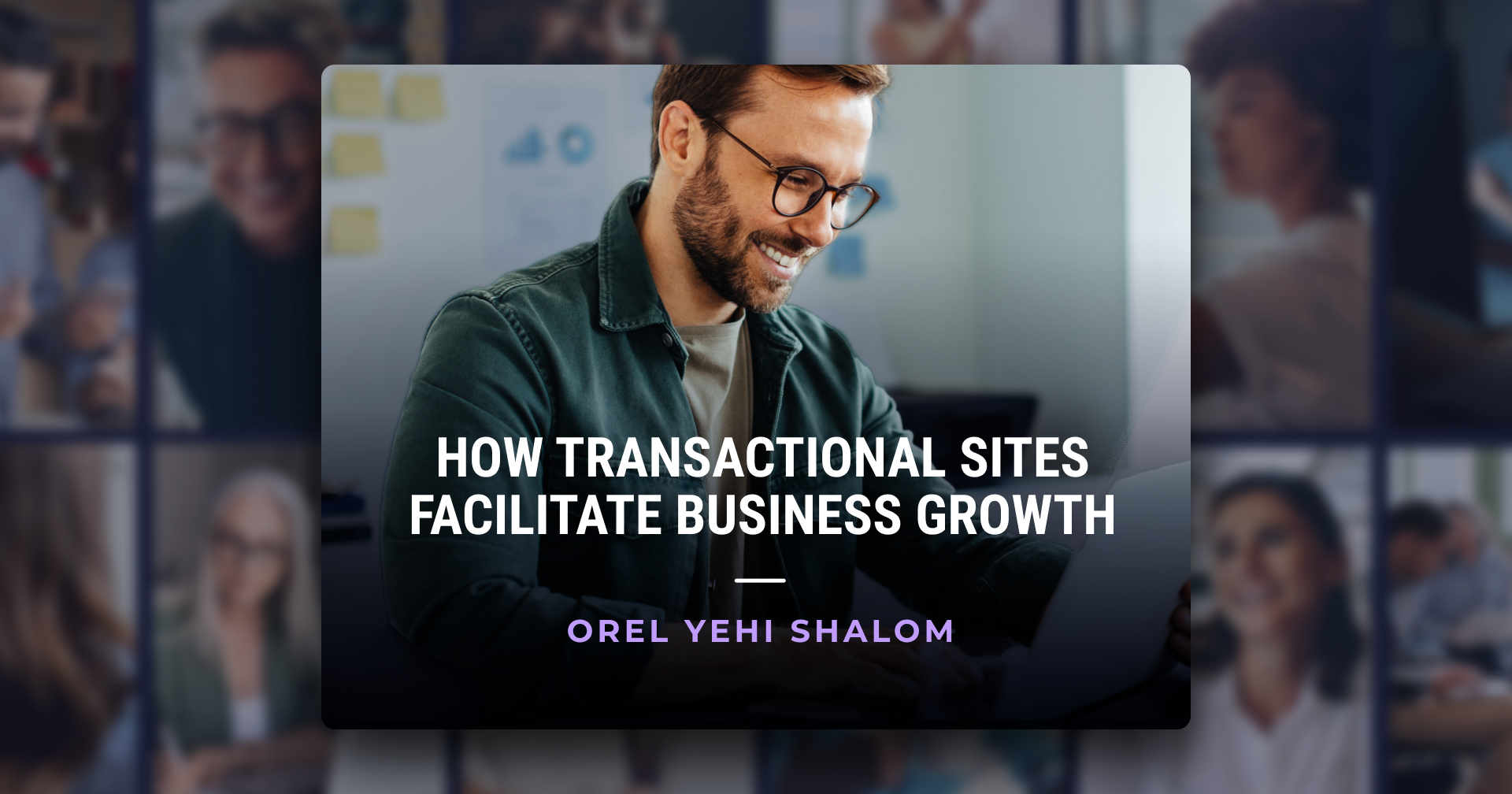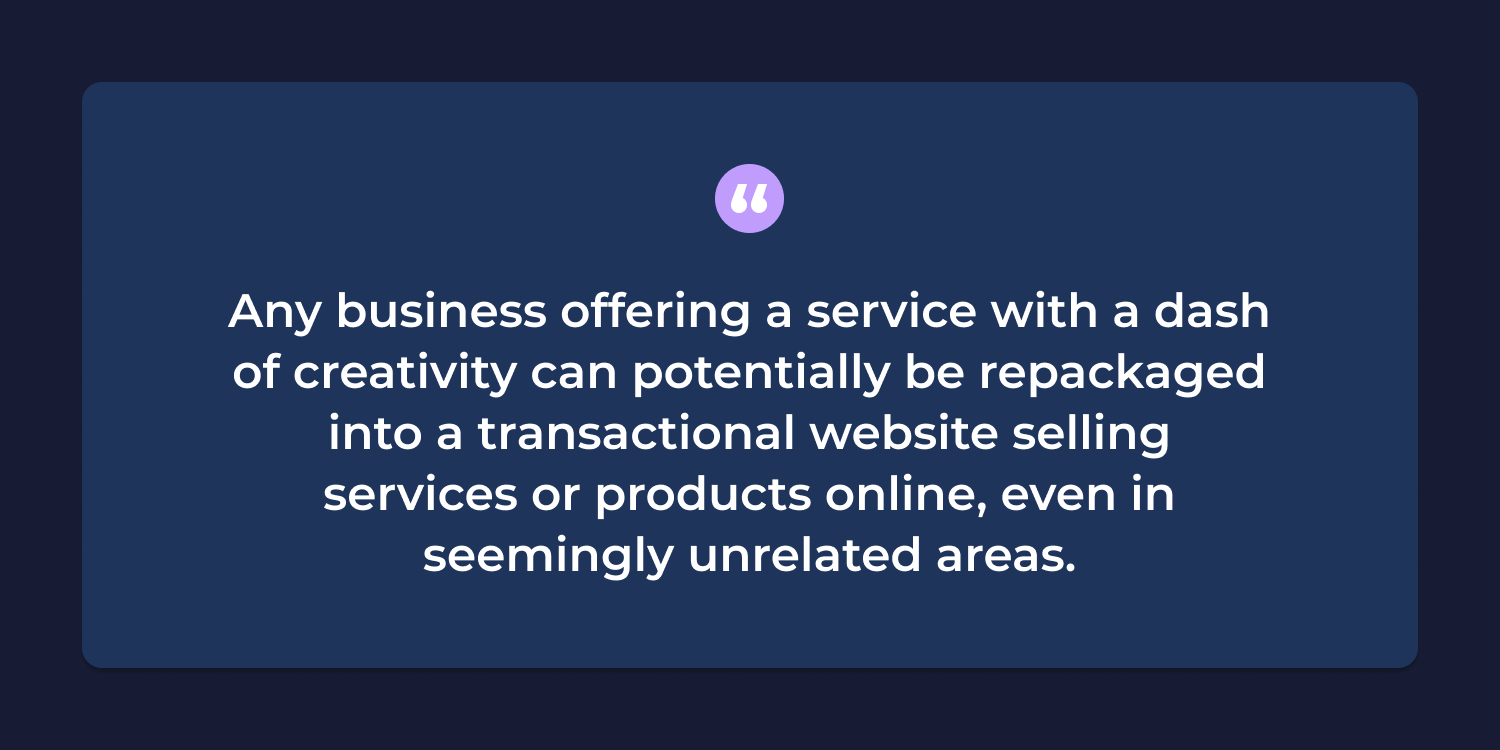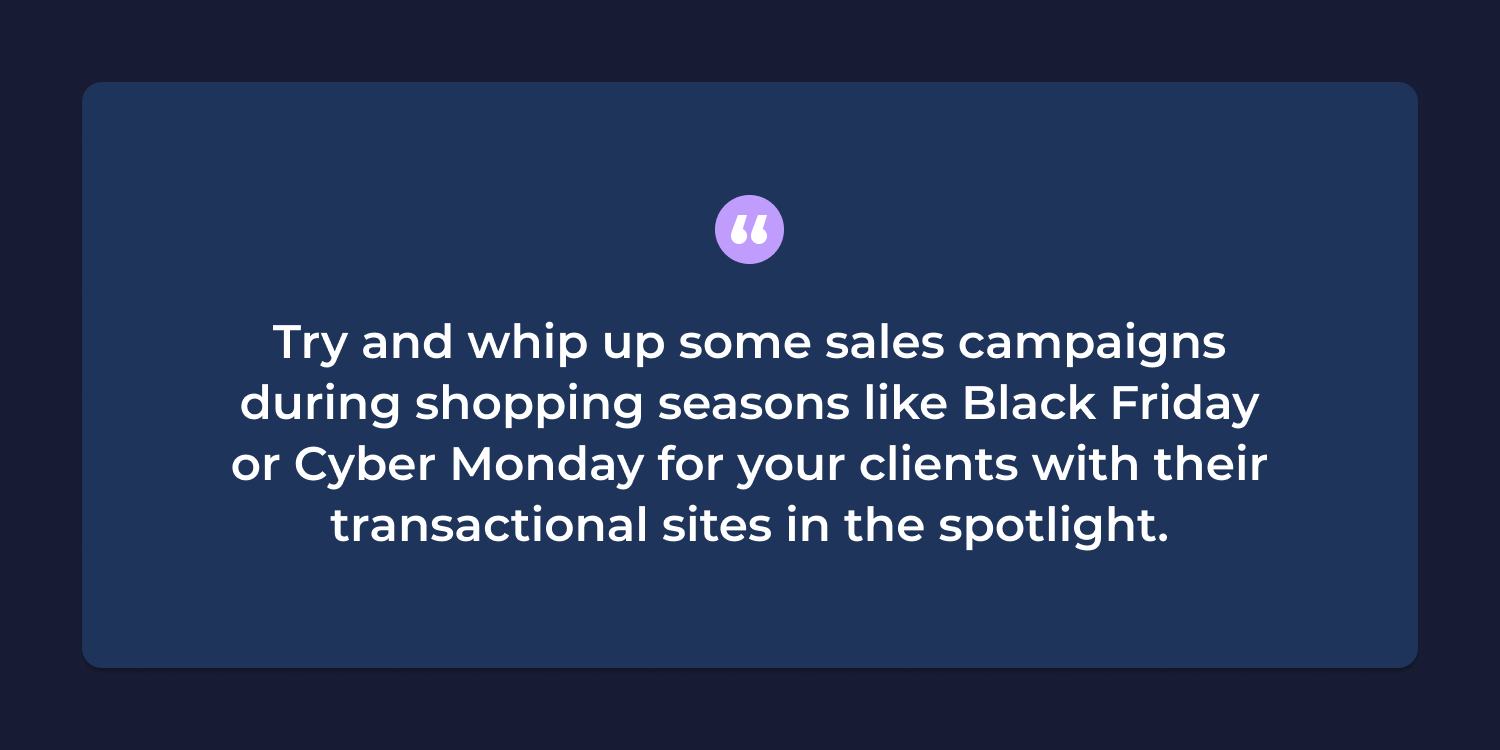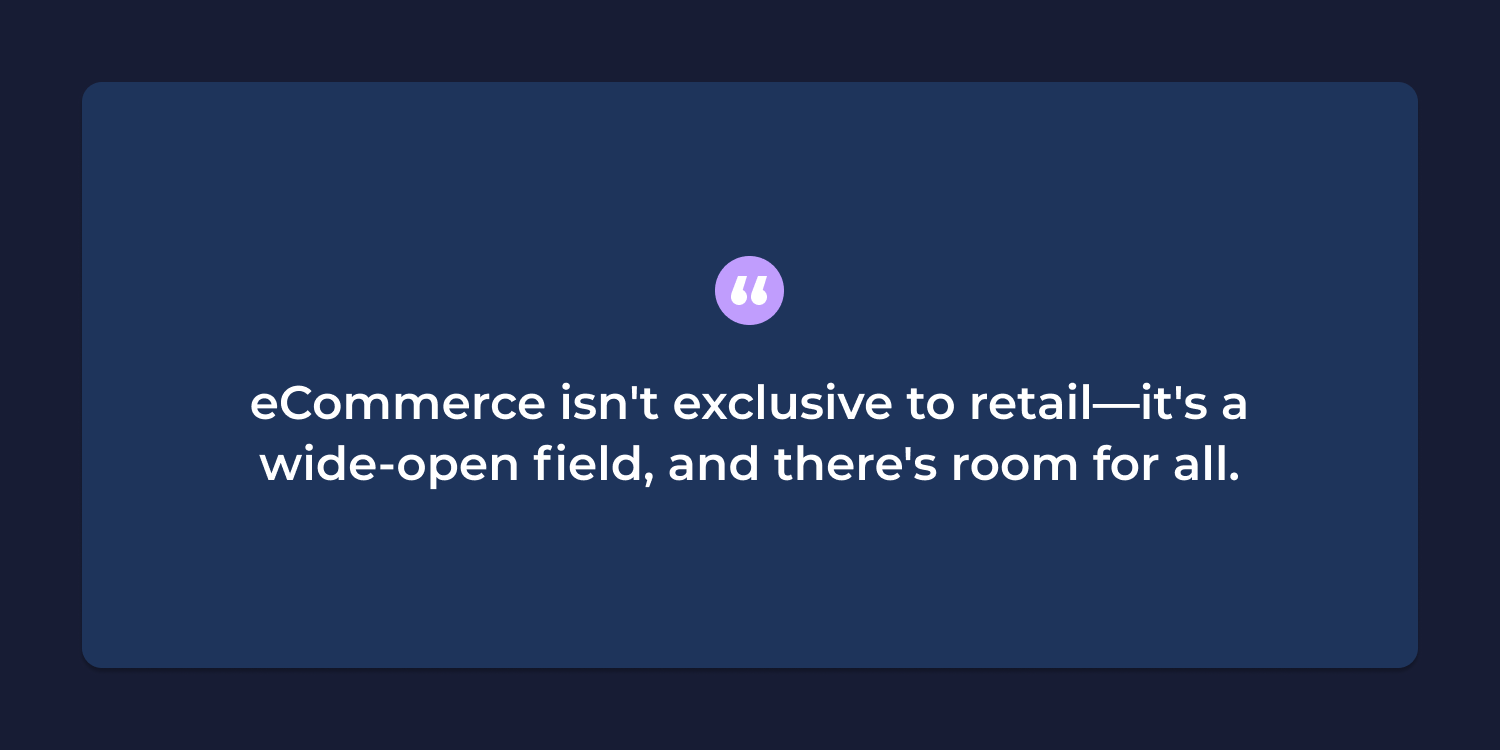In this content series, Scale and Thrive: Growth Insights for Agencies, by Agencies, we share proven tips and insights from agencies who scaled their operation and delivered proven growth. This blog post was written by Orel Y. Shalom, a successful agency owner with over a decade of experience in the field. Over the years, Orel has led more than 70 employees, producing over 10,000 websites for clients in a wide range of verticals.
When it comes to the business side of things, many agencies are overlooking a golden opportunity to boost their revenue and provide excellent value to their clients. This untapped potential lies in the market segment that bridges the gap between branded and eCommerce websites. This market segment entails the development of transactional websites that turn brochure-style client sites into 24/7 storefronts.
By adding transactional elements into client websites, even if they aren’t sales-oriented or have a feature rich product inventory, you can skillfully grow your agency as well as propel your clients’ success. You might assume I'm referring to online stores. Nope, I’m talking about a different type of online asset.
Keep reading and discover what transactional sites are all about and why they can bring remarkable benefits and opportunities to clients (and your agency), even if they operate in industries beyond the traditional retail sector.
What are transactional sites?
Transactional websites enable a
wide range of online transactions, but they aren't the traditional, fully-fledged online stores selling an extensive range of products. These websites serve as a platform for facilitating the sale of various offerings such as services, tickets, vouchers, donations, and more.
Think of a beauty therapist who offers a selection of creams to clients, a sports school selling sportswear, or a company renting out a big screen online. The main idea here is that while
these businesses do have an online sales component, it's not the primary focus of their operations. Their websites essentially act as a secondary platform for the sales of their services or products.
Why are transactional websites worth their weight in gold for agencies and clients?
In the agency world, your main goal is to secure a healthy, steady monthly income from as many clients as you can. But there's a bigger prize—higher client lifetime value (LTV). This means keeping clients around for the long haul and securing their loyalty. Let’s elaborate on client stickiness a bit more. You’ll be cementing your agency as a lifetime partner by embedding your business directly into your clients’ revenue stream.
And, when it comes to stickiness, always aim to strike the right balance: achieving longer customer relationships without adding a significant amount of extra work. Consider the benefits of charging a higher price for developing a transactional website and offering a monthly plan, and weigh them against the effort required.
The benefits go beyond increasing client stickiness. Transactional sites are a gateway for upsells. You can use them to upsell complimentary services, such as content, social, and PPC, focusing directly on revenue-based conversions.
In my experience, transactional websites can help you achieve all these goals. That’s because
clients tend to be willing to spend more on setting up and maintaining these sites.
From the client's standpoint, waking up to see new orders from their site is not just exciting—it's a massive time-saver.
They don't need to do all the selling and customer handling; their site does the work. Plus, they can get a clearer look at the return on their investment day in and day out. In short, they see how their website pays for itself. This practical proof of the site's worth helps you keep the client around longer. It shows them how much their website is making them, not just what it's costing them each year.
I also view websites as
a fantastic advantage for business owners for customer retention and increasing sales. You see, before a customer makes a transaction on your client’s website, they most likely will give their consent to use their information for promotional purposes, which makes it incredibly convenient to send them timely emails about new products and exciting promotions. By keeping customers engaged and well-informed, your clients not only retain their loyalty but also boost customers’ value to their business. It's like having a direct line of communication with customers, fostering lasting relationships and driving more sales in the process.
It’s worth noting that Amazon and other marketplaces don't quite measure up as a satisfactory alternative when it comes to selling products to your clients’ loyal audience. Consider the perspective of a beautician, for example. Why would a beautician direct their customers to Amazon, where they would probably have to incur high commission fees and risk exposing customers to competing products (or even worse–counterfeit ones)? That’s how they can get tagged by competitors and start seeing their ads.
That’s why the beautician's own website offers a trusted and comfortable environment for customers to make their purchases, all under the beautician’s own brand. Here, they can be confident in the authenticity and quality of the products they are looking for. Plus, they can’t jump ship in favor of a competitor.
Any business offering a service with a dash of creativity can potentially be repackaged into a transactional website selling services or products online, even in seemingly unrelated areas. I mentioned a beautician earlier. But let's venture a few more transactional website examples.
Picture a
lawyer or a psychologist charging a fee for a consultation in advance via their website, with an option to schedule a meeting. Or, how about a
Pilates instructor setting up a system where customers can fill out a registration form online and input their credit card info for automatic monthly class payments?
Another great example:
Booking attractions and services such as massages or karting. Websites that facilitate online bookings provide a user-friendly platform for customers to secure their desired activities in a few clicks.
In the same vein, you can have
event organizers selling concert tickets online, cutting out unnecessary middlemen and giving visitors a seamless ticket-buying experience.
Or, an
art school that offers a variety of courses to buy and summer camps
to register for. They reach a broader audience by offering them directly through their website.
I can also think of
charities that rely on donations. With a dedicated donation page on their website, they can effectively communicate their cause and make it easy for supporters to contribute and make a difference.
You see, the possibilities for transactional website examples are endless.
You get where I’m going with this. I cannot stress this enough, practically any website can be transformed into a transactional one when you think about it creatively.
There’s more to transactional websites than meets the eye
There’s so many business opportunities to catch with transactional websites. My tip is to encourage clients not to sit on the sidelines of holiday shopping seasons.
How can your agency encourage clients to build transactional websites?
Here's an action plan: Whip up some examples and success stories by industry and roll them out in newsletters to respective client segments. It's key to know which segment each client fits into. Once you've got that sorted, you can prepare a shining example of a successful transactional website, say for a beautician or a lawyer. Craft their success story into an engaging newsletter. Then, send it out to similar business segments with an enticing offer to upgrade. I’ve found that it's a great way to show your clients what's possible.
Don’t forget to keep tabs on your clients' activities on these websites. In my experience,
those clients who actively manage the website have a higher probability of becoming valuable clients interested in expanded advertising and website promotion services. This opens up exciting possibilities for your agency to generate income streams from each client, while also enhancing their overall value.
Final thoughts
Transactional websites hold incredible potential for agencies and their clients. They're a gateway to more revenue and exceptional value. For clients, a transactional website turns from a cost center into a money-making asset. Plus, these sites open up avenues for additional services like advertising and promotion, boosting both income and client value.












